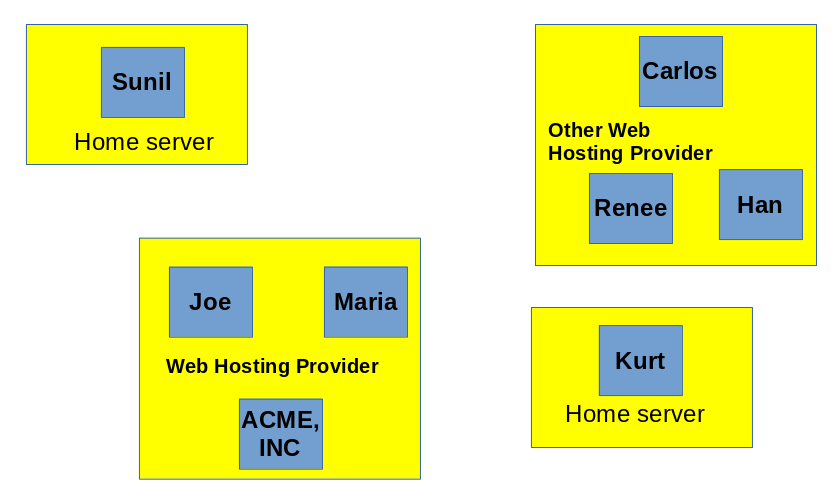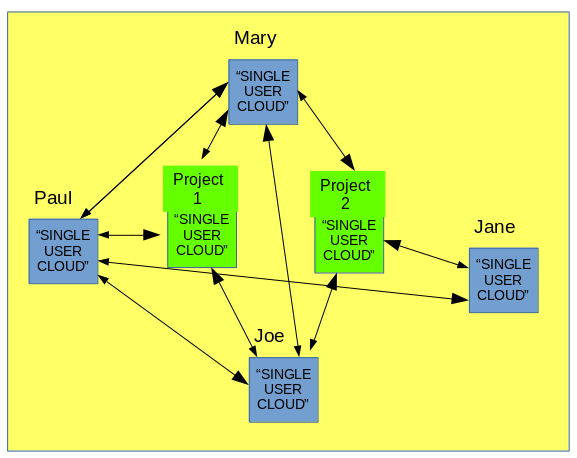Individual or collective clouds? Both, of course
Yesterday, I presented what I consider a perfect confirmation of my views on “Twitter replacements”. Today, I “defend” that position from “accusations” of individualism.
(I’m joking, of course, when I say “defend” and “accusations”).
In that post of mine, I (re-)explain why I think it’s better to start from people, and therefore from building individual clouds, rather than whole new, more or less featured, “platform” that are full alternatives to Twitter, Facebook and so on.
Reading that post, Nathan Schneider, leading advocate for platform cooperativism, tweeted: I prefer a.bit more collectivism than every individual having their own domain. I’d prefer #mastodon and clouds at the.parish level
A few weeks ago, I had had substantially the same objection on Facebook, in reaction to this: I think that we’ve got already much exasperation of individuality spreading trough society, then why replicate this in the net instead of growing as a comunity?
Here is what I replied back then, because it partially also answers Nathan’s comment:
the question “why replicate this in the net instead of growing as a comunity?” has at least two answers:
- at the tecnical level: because what I suggest is complicated, but it is also MUCH simpler to do than anything else the “platforms camp” is proposing, or worrying about. The choice here is between doing something that can really work and take off in a year or two, or waste another 5, probably ten years, dreaming around. It’s been already almost 5 years since I first conceived the percloud. Since then, most activity has been in the “platform camp” and has obtained nothing remarkable, or that could really scale up and last.
- at the human/social level: because “growing as a community” is impossible, at least if we really mean “a” as ONE, and consequently one platform, and in an acceptable time frame. Human beings are individuals first, and only then members of MANY communities, often not overlapping with each other. If you look at the picture in my post, the yellow boxes surely can and IMO should often be cooperatives, communities sharing some ideal, or practical purpose. But the individuals in them MUST be free to leave those communities, without losing contacts, content posted online etc. That is way, way easier to accomplish if you first associate one box to each person, and build everything else around it.
As I said, this is a partial answer. For everybody’s convenience, and in order to fully answer Nathan’s comment, here is again the same picture in that other post:

In that picture, every yellow box is one physical server, that hosts many, totally independent (Gnu/Linux) containers, that is the blue boxes. And each blue box is one instance of a “single user cloud” that is configured/optimized for an individual (email, file storage, blogging… see here and here for details). This cloud may be a customized instance of cozy cloud, cloudron or similar products. Each individual has at least one such box reserved to her personal communication, online presence…
Now, let’s go back to Nathan’s comment, but starting from identities. I argue that what Nathan calls “domain” in his tweet is, or should be, the online version of somebody’s name. If that it what it is, it has to be both unique, and independent from any specific platform, community or communication service. Regardless of its format, and underlying architecture. Regardless, that is, if it is mastodon.marco or mastodon.social/@marco. I am pretty sure that we all agree on this, so I’ll comment on this, modified version of Nathan’s tweet (note the parenthesis…):
I prefer a.bit more collectivism than every individual having their own individual cloud(s). I’d prefer #mastodon and clouds at the.parish level
The parenthesis means that each “individual” can (and in my opinion should) have as many identities, that is personal clouds as she wishes. But the most important thing, the one that fully answers (for me, of course) the question asked, is that those yellow boxes can and should host ALSO community clouds, at the parish or similar levels, as in this other diagram from a draft of mine:

That green box there would be the same software platform as the blue one, PLUS apps for GROUP WORK (kanboards, voting, whatever). You can replace “project 1” in there with any community you want: parishes, golf clubs, specific cooperatives, everything really.
To sum it up, my vision is that, in addition to, and on the basis of, my answers on Facebook copied above:
- probably, more than being against collectivism, I’m against starting from it
- I argue that we must start from giving individuals as many individual clouds they need, each with its own “permanent” domain name = identity
- community clouds with extra features for specific “group activities” of all conceivable sorts, from fan fiction to urban farming, are equally needed (see below)
- individuals should “enter” these community clouds, and participate in them, from their individual clouds, instead of having extra identities inside them
- what “platforms”, and the cooperatives behind them, should provide, are only the several boxes in the diagrams above
What the latter point means is that platforms should be at the lowest possible levels, e-g community-owned, non-profit, bare-metal hosting of the software that constitutes the blue or green boxes. In such infrastructure, the managers of each green box could admit or remove individuals from that box as they please, without touching the underlying identity and online presence of those individuals.
And you could still build as many community clouds as you want, but each green or blue box would be 100% free of jump from one yellow box to another, in any moment. And each “yellow box manager” would be equally free to expel any of those boxes, without disrupting their online identity, presence and free speech rights.
Implementation and, even better, governance of such infrastructures would be much easier than full-blown “community platforms”, no matter how open, inclusive and democratic they could ever be.
What should still be somehow “centralized” is the equivalent of the Domain Name Service, that is how to declare and find someone’s cloud/identity online. That’s a topic for future posts.
Last but not least…
- It so happens that we of the Free Knowledge Institute are working on setting up just what I call a “community cloud” above, for a project we’re working with, in Barcelona. Please contact us for details.
- For some background on the percloud, you may want to start from here. Many of the questions you may have about the percloud are probably answered .
Who writes this, why, and how to help
I am Marco Fioretti, tech writer and aspiring polymath doing human-digital research and popularization.
I do it because YOUR civil rights and the quality of YOUR life depend every year more on how software is used AROUND you.
To this end, I have already shared more than a million words on this blog, without any paywall or user tracking, and am sharing the next million through a newsletter, also without any paywall.
The more direct support I get, the more I can continue to inform for free parents, teachers, decision makers, and everybody else who should know more stuff like this. You can support me with paid subscriptions to my newsletter, donations via PayPal (mfioretti@nexaima.net) or LiberaPay, or in any of the other ways listed here.THANKS for your support!